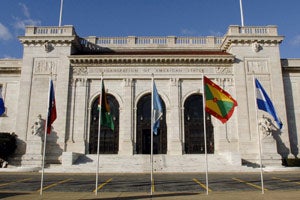“Much of the world…focuses on the bad things that happen when kids get placed in international adoption. When you shut down international adoptions in order to address bad things which occasionally happen, what you do is commit monumental human rights violations.”
That was the testimony of Harvard Law School Professor and Faculty Director of HLS’s Child Advocacy Program Elizabeth Bartholet ’65 before the Inter-American Commission on Human Rights on Nov. 6. With the goal of “changing the debate” on international adoption, Bartholet spoke before a hearing on the “Human Rights of Unparented Children and International Adoption Policies” in the Americas came after a request made by the HLS Child Advocacy Program (CAP) and the Center for Adoption Policy.
International adoption is the subject of a heated debate among those in the human rights field. The hearing came in the wake of policies that have virtually shut down international adoption in Guatemala, Honduras, and Peru.
The hearing represented a major development in the human rights debate surrounding these issues, as the Commission addressed human rights violations that to-date have been largely ignored, says Bartholet. News of her testimony appeared in major publications throughout Latin America, including Peru’s El Comercio and Peru 21.
In her testimony, Bartholet argued that restrictions on ethical international adoption violate children’s basic human rights by condemning them to damaging institutions or to the streets. She added that every child has a right to be placed in a nurturing permanent home, whether that home is in the country of birth or abroad. Adoption abuses should, Bartholet says, be addressed through enforcement and strengthening of laws prohibiting such abuses, not through closing down international adoption and thus denying homes to children.
Listen to an audio recording of the testimony at the Inter-American Commission on Human Rights.
Bartholet testified alongside a delegation including: Paulo Barrozo S.J.D. ’09, assistant professor of law at Boston College Law School; and Karen Bos and Charles Nelson, child development experts affiliated with Children’s Hospital in Boston, the Harvard Medical School, and the Harvard School of Public Health.
The delegation urged the Commission to initiate an investigation to examine what effect closing international adoption opportunities in Guatemala, Honduras, and Peru has had on unparented children.
Bartholet recently wrote “International Adoption: The Human Rights Position” which will appear in Global Policy, Issue 1, January, 2010. The 39-page article calls for the expansion of inter-country adoption.
In the article abstract, Bartholet wrote, “International adoption is under siege, with the number of children placed dropping each of the last several years, and many countries imposing severe new restrictions. Key forces mounting the attack claim the child human rights mantle, arguing that such adoption denies heritage rights, and often involves abusive practices. Many nations assert rights to hold onto the children born within their borders, and others support these demands citing subsidiarity principles. But children’s most basic human rights, at the heart of the true meaning of subsidiarity, are to grow up in the families that will often be found only in international adoption. These rights should trump any conflicting state sovereignty claims.”
In 2004, Bartholet, a child welfare expert who has taught family law at HLS for over two decades, established the Child Advocacy Program at HLS, a program focused on child welfare, education and juvenile justice. She teamed up with her former student Jessica Budnitz ’01, founder of a clinic providing legal services for children in delinquency proceedings, to create the program, with its three different academic components.
In class, Bartholet teaches students about law and policy governing things such as parents’ rights, child abuse and neglect, and special education. In the policy workshop, child welfare advocates and policy-makers come into the classroom to discuss their organizations and to debate with students the pros and cons of their different approaches to social change.
Through their course, “The Art of Social Change,” the duo hopes to give students an opportunity to explore successful methods and policies that better protect children. See sidebar story.
